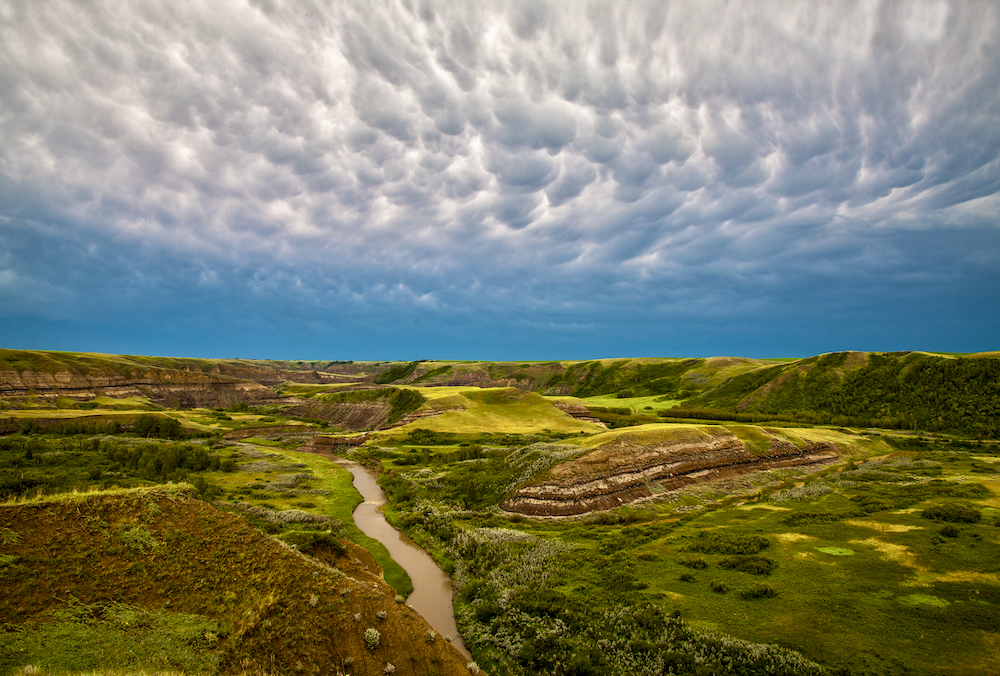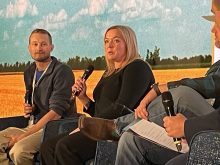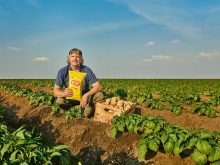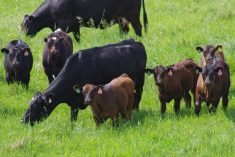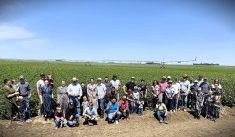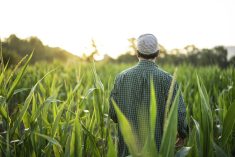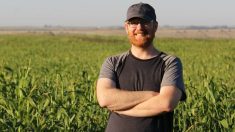Elaine Bellamy has known from the time she was a small girl — there’s something special about the land at Will Farms.

“When I was a five-year-old girl, I decided to take a spoon outside and have a taste of the dirt,” the Rosebud-area farmer recalled with a laugh. “Apparently, I thought it was pretty good, as I do everything possible now to take care of that natural resource.”
Environmental stewardship has had an important place on the 10,000-acre grain farm ever since those early days but despite that, Bellamy doesn’t consider herself to be one of those ‘sustainable farmers.’
“Usually when people think of sustainability, they think of the more innovative projects like cover crops, and I don’t do that,” she said. “My goal is more to take care of my farm, take care of my soil, and take care of my operation so that it is — in my words — sustainable and capable of being passed on to another generation.”
Read Also
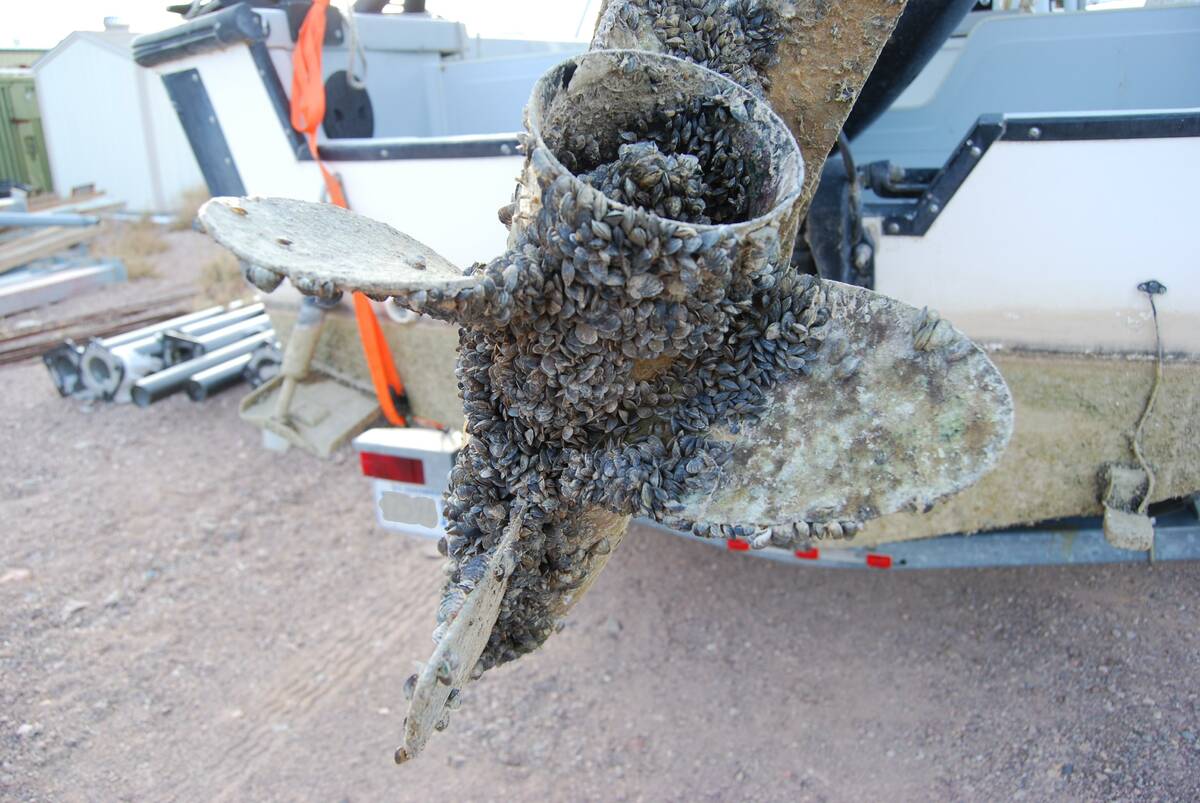
Invasive species council lending a helping hand to Alberta agricultural producers
Alberta Invasive Species Council unveils the huge economic effect of keeping invasive species unchecked to agricultural production in the province.
Bellamy is just one of many female farm leaders who are driving conservation efforts on their operations, said Marie Golonka, agriculture co-ordinator at Rural Routes to Climate Solutions, a central Alberta organization that promotes “on-farm climate solutions” through workshops, field days and a podcast.
“Women play a big role in bringing this issue to the forefront,” said Golonka. “Something like 70 per cent of our audience at Rural Routes to Climate Solutions is female. I definitely feel women are a bit of a driving force behind this movement.”
And that’s having an impact, she added.
“Women have always played a really active role on the farm, but being able to take on more of those decision-making roles on the farm has allowed them to try some different ways of doing things,” she said. “I think there is an emphasis on the bigger picture, and women are definitely talking about climate change and thinking about the future.
“So it’s really great to see them in these decision-making roles on the farm and that be the direction they want to take things.”
‘A long-term game’
Like all farmers, female farm leaders want to be good stewards of the land and many take a longer-term view.
“They’re thinking about future generations. That’s their goal for doing it — they want to leave something better for the next generation,” said Golonka.
Bellamy does that through production practices that promote soil health — leaving straw on fields to build soil organic matter; annual soil testing; and optimizing input applications, among other things.
“I do my best to balance growing good crops and take care of the environment as much as possible,” she said. “I like growing food to feed the world, and I want to do the best I possibly can at it.”
That’s also what led her to put roughly 3,000 acres of land in the Rosebud River Valley into a conservation easement with Western Sky Land Trust.
“We thought about it for a number of years and finally moved on it, because I really wanted to protect the land that’s located along the Rosebud River,” she said. “The easement is our way of protecting it. It will always remain habitat for the wildlife that lives there.”
Bellamy credits her father, who passed away in 2002, with instilling a long-range stewardship mindset in her.
“It was a real honour to be the recipient of Will Farms from my father,” said Bellamy, who farms with husband Keith and daughter Heidi. “I know how much he loved this farm, and as we were growing up, he built a lot of pride in us. We were proud of our farm and very proud of our father for how he built the operation from the little bit of land he started with.
“So I feel a real sense of responsibility toward the land, and I want it to be able to continue to be productive.”

Bellamy’s neighbour Wendy Clark has also put a conservation easement on her 2,000-acre grain operation along the Rosebud River Valley.
“Farming is a long-term game, and we want our farm to stand for many generations,” said Clark, who farms with husband Richard. “So you can’t mine the land or you’ll have no future economically. That goes hand in hand with conservation.
“Conservation is just a natural extension of farming sustainably because it’s economically the right thing to do.”
Climate change and conservation
Like Bellamy, Clark downplays her efforts for farming sustainably.
“I don’t want to make it sound like we’re anything really very special, because we aren’t,” she said. “All our neighbours basically farm exactly the way we do — and what we do are the typical sustainable farming practices that most use.”
Aside from the easement, any wetlands on the operation are given a buffer to protect them as wildlife habitats. Practices like continuous cropping and direct seeding have led to an increase in soil organic matter and a reduction in erosion. The farm also employs 4R stewardship (using the right source and right rate of fertilizer at the right time and right place) and modern technology means there is no overlap of fertilizer or herbicides. That has both reduced inputs and improved soil health, she said, adding pest control products are used “very carefully.”
Clark said she has been able to push some of those practices forward in part because she has equal decision-making powers, but also because of the financial management skills she brings to the table.
“We’re very much management partners, but my value to the operation is that I have a skill set that I can bring to it,” she said. “Both Richard and I were determined to follow through with conservation going forward, but my contribution was to show how we could do it financially and make it happen.
“It’s very important that women play to our strengths so that we’re confident about how we’re moving forward.”
And as climate change reshapes agriculture across the Prairies, it will become even more important for farm leaders — female and male — to think about how they can adopt production practices that will protect the land, said Golonka.
“With climate change, things are getting more and more unpredictable every year, so as we move forward, it’s really important to factor that into decisions for the success of the farm,” she said.
Bellamy agrees.
“Customers are becoming much more concerned about how their food is grown and whether it was produced safely and sustainably,” she said.
“Regardless of your gender, if you own a farm, you need to look at the entire picture and make those decisions that are going to drive your operation forward sustainably.”

